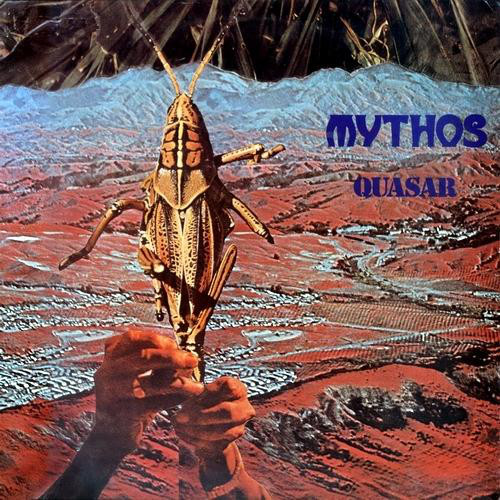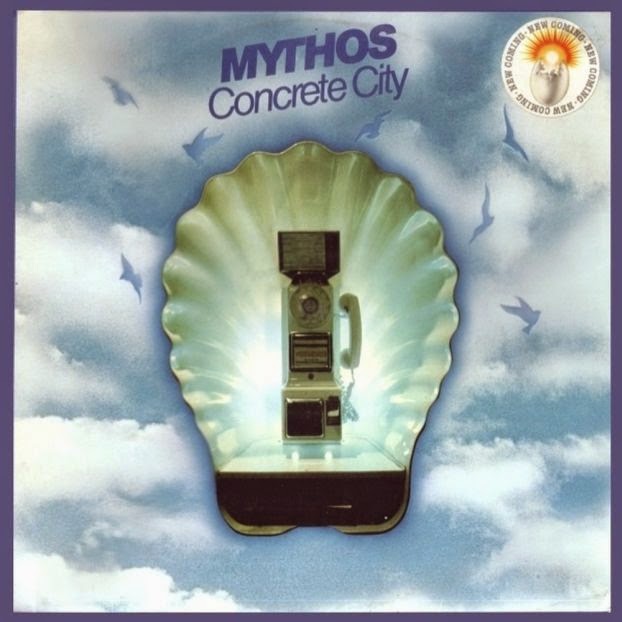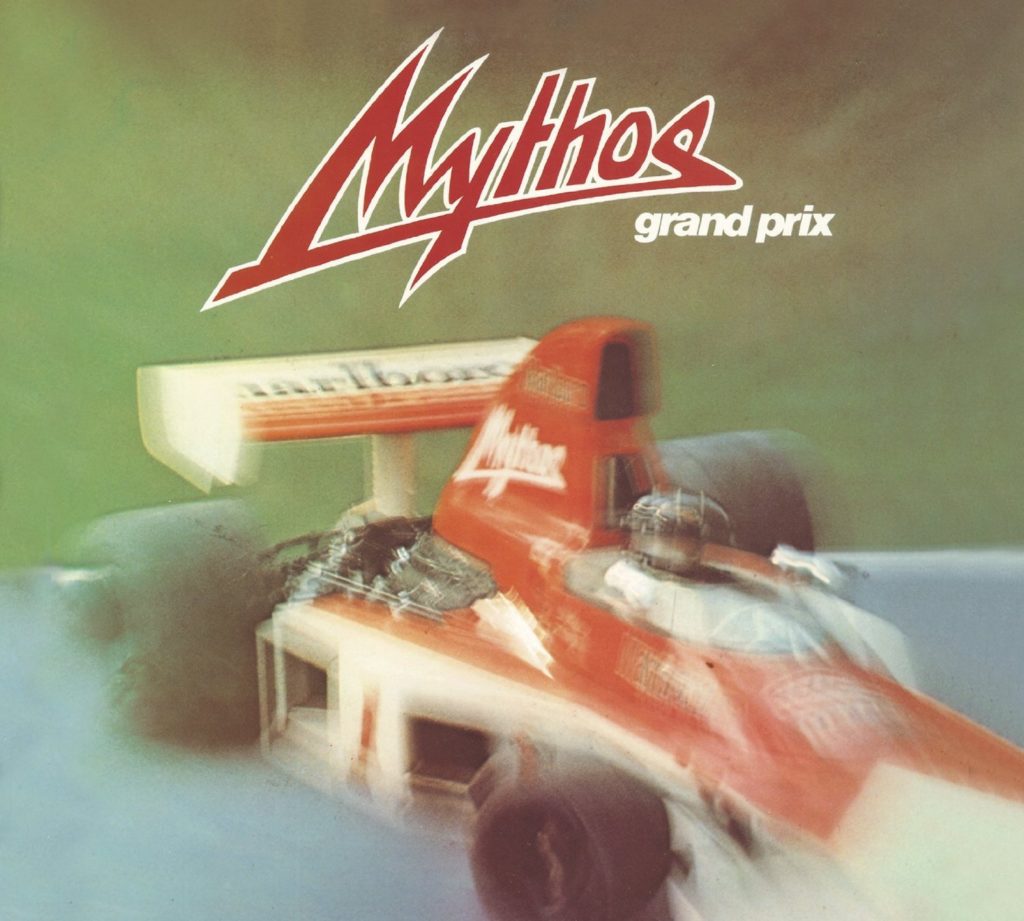Mythos
Oriental Journey – Hero’s Death
Transatlantik Non-Stop
Harry Chanceless
Concrete City
Quasar
Flut-e-Quenzer: The Knight
Flute really had its time in the rock spotlight in the 70s, didn’t it?
A few weeks back, I wrote about Steve Hillage. One thing I like/respect about Hillage is his willingness to change with the times and embrace new genres. He started as the guitarist of the supremely out-there Gong, went solo with a series of fantastic prog rock albums, shifted gears entirely into synthpop only to take a break from the music scene entirely for over a decade before reinventing himself as ambient/electronic musician. That’s bold.
An artist that went along a similar path to Hillage was Mythos, which started off as a group in 1972 but slowly morphed into a solo project by lead vocalist/flutist/keyboardist Stephan Kaske by the end of the decade. Their 1972 self-titled debut is a well-regarded classic by krautrock die-hards, thanks to its unique combination of jazz, folk and space rock. Their 1975 follow-up, Dreamlab, featured an entirely new line-up save for Kaske, but mostly kept the same sound. It was a little more spacey with some more keyboards thrown in, but I hazard to guess that most fans of their debut dig on that record too.
But things would take a hard turn, and fast. Again with an entirely new line-up, and this time with Kaske taking reigns creatively (he’s the sole credited songwriter on all Mythos releases from this point on), the band would release Strange Guys in 1978, followed by Concrete City in 1979. Both albums completely disregard the band’s penchant for long-form experimental pieces and lieu of hard rock mixed with synthesizer solos and the occasional flute trip. Gary Numan by way of Alice Cooper and Jethro Tull.
The lines between prog and new wave would blur even more with their next release, Quasar, which came out in 1980. I’ve listened to this record over a dozen times since discovering it last month, and I still struggle to describe it. I’ve read comparisons to Ultravox, which make sense, but while early Ultravox was synthpop masquerading as punk rock, I feel like this is prog trying to work on the dance floor. The sequencers and synthesizers are so prominent here. The acoustic drums are the only thing on this album that ground it to any rock sound at all, and they’re often so low in the mix that it barely matters. When the electronic elements mix with Kaske’s flute, the album takes on a creepy vibe. One of the tracks I’m sharing from that album, “Flut-e-equenzer – The Knight” gives Goblin and Carpenter a ride when it comes to instrumental creepiness.
Quasar is Mythos’ best album not only because of its killer combination of electronic and classic rock elements, but because it’s the only album in their entire discography where I would call Kaske’s vocals “passable.” At best. I don’t think it’s unfair to just flat-out say it: Kaske can’t sing. At all. Kaske is probably a keyboardist first, a flutist second, and a vocalist eighth (I mean, I bet he’d be better at plumbing, car repair and a myriad of other things if he gave them a go). Once you get used to it though, there is a charm to his occasionally off-key, always off-kilter way of vocalizing. Kaske isn’t the first singer with no observable singing talent, after all (insert joke about Bob Dylan). And on Quasar, the robotic nature of the music mesh well with Kaske’s vocals, which one could charitably describe “as if a robot impersonating Ian Curtis was reprogrammed to sound like Bryan Ferry on downers.”
But even Kaske had to know that vocals were weak point. In 1982 the “band” (which was finally only just Kaske and no one else) released Grand Prix, and the album is largely an instrumental electronic affair. Most all of the vocals are run through a vocoder and other distortion effects, and are brief at most. Only the hideous “Robot Secret Agents” features Kaske on lead vocals, singing in his natural voice, and boy…that track is…um…something else.
Yikes.
But aside from that, Grand Prix is a damn good record. Prog fans hate it, probably because it’s not a prog album. This is synthpop through and through, composed and performed almost entirely on electronic instruments…with flute, of course. It’s a good album of Kraftwerk-inspired technopop…with flute! I mean, how many albums can you say that about?
Jethro Tull gave flute a bad name, it’s not fair.
I find something oddly charming about Mythos. Their music is just so strange. There are more ambitious and experimental krautrock bands. There are better and more technically proficient prog bands. There are more upbeat and fun synthpop acts. Mythos tried their hands at many a genre, yet mastered none of them. They’re utterly forgotten. Failures three times over. All of their albums have weak spots. The early ones sometimes drag on too much. Their prog albums have their fair share of weak numbers. Grand Prix at times comes off as both dated and an obvious Kraftwerk rip-off. But each of them have their own qualities that make them stand out too. Their first two albums combine folk, jazz and electronics in a way that even most of their fellow krautrockers never even tried. Concrete City and Quasar and their amalgamation of metal and synthetics, create a sound that is at times menacing, and never boring. And Grand Prix is just a really fun, great-sounding record that is as charming as it is dated.
If you dig the sampling of Mythos that I’m sharing tonight, I encourage you to dig deeper and check out their albums proper. Again, I really recommend Quasar the most. But if you like pure early electronic music, you really can’t go wrong with Grand Prix either. Do be careful with their digital re-issues, however. While I haven’t found much fault with the CD copies of Grand Prix and Concrete City that I bought, a lot of reviews of their other albums cite multiple audio defects with their other CD re-issues. With those, it might be best to stick with the original vinyl copies. Thankfully, as literally no one cares about this band, you can usually find them online for a pittance.
Mythos. Occasionally amazing. Usually okay. Sometimes bad. Never boring.




“Robot Secret Agents” is a kind of minor classic among the minimal synth/wave crowd, actually 🙂
You may also wish toinvestigate two guys who played on “Strange Guys” and “Concrete City” – they went their own way in 1980 under the name The Twins and became quite popular in Europe in mid 1980s. Now that’s synthpop not even trying to mascarade as synthpop! Their first album, “Passion Factory” from 1981, is especially interesting as a great pastiche of Gary Numan of 1979-80, when Numan himself have abandoned his early style. If you find them – do check them, you may like it.